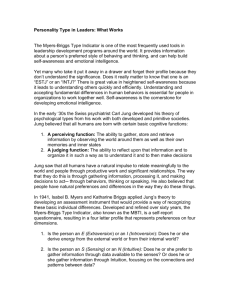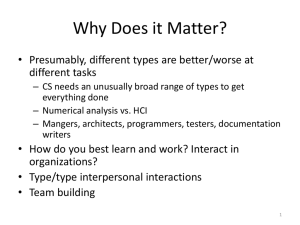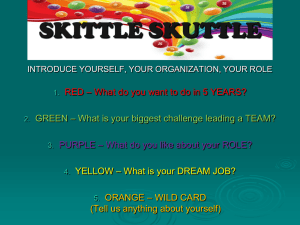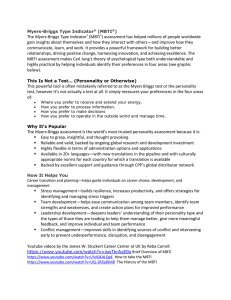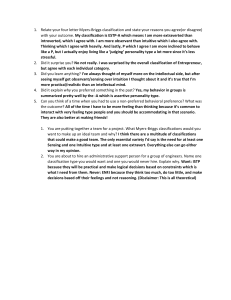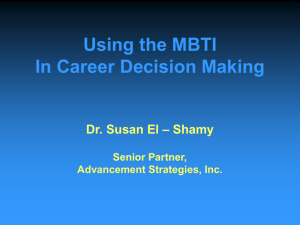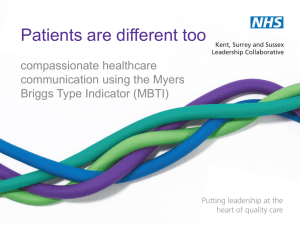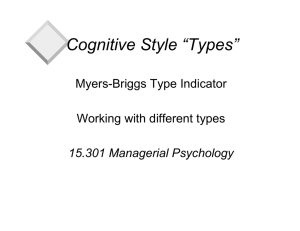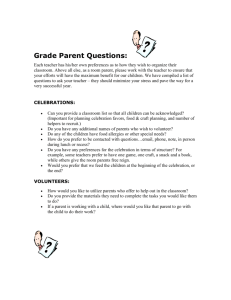MBTI for class
advertisement
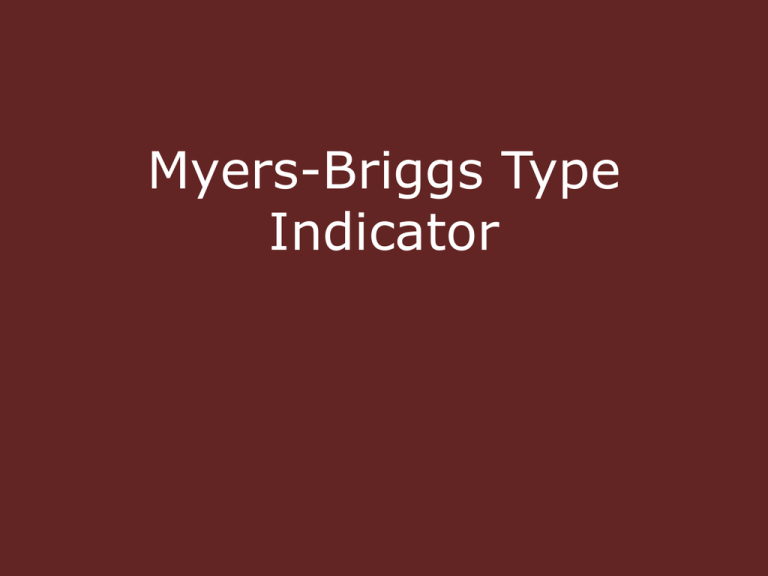
Myers-Briggs Type Indicator MBTI Background • Based on Jung – late 1800’s and early 1900’s – Interested in individual differences to explain behavior • Preferences emerge from genetic predisposition and influence of early environment – What we pay attention to in the world (S/N) – How we make our decisions (T/F) MBTI Background • Myers-Briggs expanded the theory in 1956 • Added the following: – Where we get our energy from (E/I) – How we get along in life (J/P) Preferences • Measures your preferred way of being • Preferences come easily to us – What we are comfortable with – Seems natural to us • No right or wrong preference or good or bad type • Can do the non-preferred side, but after a while doesn’t feel good • Happier when you work within your preference MBTI Information • • • • • Assessment is right 83% - very high One piece of the puzzle You tell the instrument Doesn’t measure skills or abilities Used in corporate training, marriage counseling, and career counseling • Career goal: To help you find a compatible work environment that allows you to use your preferences MBTI Information • You confirm or disconfirm results • Factors that can affect results: – Social expectations – Stress/crisis – Answer as you wish you were – Test-taking situations Extrovert/Introvert Scale Where do we get our energy from? Extravert • • • • • • Get energy from outside self Relaxed, confident After-thinkers Mouth and mind are connected Think things through by talking Seek variety and action – Tend to dislike complicated procedures – Get bored with slow, long projects • Like background noise • Doing a lot gives them more energy Extravert • Can jump into writing • Take breaks for outer stimulation – Don’t mind getting interrupted • Want to be with others – many friends • Have many interests • Prefer oral communication – Talk things over in order to understand them • Share thoughts freely – Can learn a lot about them in a few minutes Introvert • • • • • • • Get energy from within self Energy directed inward toward concepts and ideas Reserved, quiet, questioning, careful with details Think things through Seek quiet for concentration Learn best by pausing to think Doing a lot makes them tired Introvert • • • • • • • • Pause to think in writing Want time alone Have fewer interests Reflection over action Don’t mind working on one project for a long time Prefer written communication Guard thoughts They talk, but to fewer people and get to know them first E/I Scale Exercise Sensing/Intuitive Scale What we pay attention to in the world? Sensing • Rely on experience and factual data • Seek specific information, specific examples • Pay attention to real things – five senses – That is what is real to them • Present enjoyment • Like hands-on experience • Can have hunches but want the data to back it up • Prefer using learned skills Sensing • Use past experience or detail to make sense of new experiences • Live life as IS • Make few factual errors, good at precise work • Prefer to follow an agenda, the routine • Seek predictability • See difficulties as problems that need solutions • Want to know what IS • More realistic about how long a job will take • Good sense of direction, good eye witnesses Intuitive • • • • • • • • • Go with their 6th sense – their gut Look at the big picture Look toward the future Rely on possibilities, ideas, and connections Like change and to rearrange life Create own directions Can read between the lines Prefer adding new skills Like solving new problems Intuitive • • • • • • • • Like complex problems Like general concepts, not specifics Can depart from the agenda Dislike the same thing over and over again – Impatient with routines Emphasize the theoretical Jump to conclusions Want to know what could BE See difficulties as opportunities for further exploration S/N Scale Exercise Thinking/Feeling Scale How you make a decision? Where you go first to make a decision? Thinking • Use logical analysis to make a decision – Look at the logic of situation • Decision is clear and easier to make • Focus on things, truth, and principals – Focus is not on people when making decisions • Want objective material to study • Question first • Know when reason is needed • Can control emotions when making a decision Thinking • Believe treating everyone as equal is fair • May overlook people in favor of getting tasks completed • Can come across as brief, business-like and impersonal • May seem hard-headed • Can get along without harmony • May hurt others feelings without knowing it • Will eventually go over to feeling side to consider other options Feeling • Base decisions on human values, needs, and feelings • Remain personally involved when making decisions • Focus on people and harmony – Want things to be pleasant • Support others – Know when support is needed • Accept first, then question • Harder to make decisions Feeling • • • • • • Overlook tasks in favor of people Tend to be sympathetic Believe treating everyone as individual is fair Want to relate to material they are learning about Relate well to most people Have to go over to Thinking side otherwise would never make a decision T/F Examples Judging/Perceiving Scale How we get along in life? How we get through our day? Judging • • • • • • Bad name for it – does not mean judgmental Like to organize the world Like to be settled, planned out, ordered Like watches, routines, deadlines Value dependability Can’t play until work is done – Harder to start, but then focus on completing task Judging • Finish BEFORE the deadline • Do their best work when they follow a plan – Hard to deviate from the plan • • • • • Focus on goals, results, achievements Prefer no surprises Want only the essentials of job Make decisions quickly Quickly commit to plans or decisions Perceiving • • • • • • • More spontaneous, whatever attitude Curious, flexible, adaptable, tolerant Value change Easy to start things – hard to finish Like things to be open, flexible Like interruptions and changes in plans Welcomes new insight on a person, situation or thing Perceiving • Finish AT the deadline • Want to know all about a new job – not just essentials • Put decisions and tasks off – Postpones unpleasant tasks • Believe they have the right to change their mind or plans • Keep things open-ended, no plans • Trouble making decisions J/P Examples Percentages of U.S. Population ISTJ ISFJ INFJ INTJ ISTP ISFP INFP INTP ESTP ESFP ENFP ENTP ESTJ ESFJ ENFJ ENTJ 11.6% 5.4% 4.3% 8.7% 13.8% 8.8% 8.5% 12.3% 1.5% 4.4% 8.1% 2.5% 2.1% 3.3% 3.2% 1.8% Wrap Up • Questions? • Do What You Are - book • Online Resources: – My Personality Info: http://www.mypersonality.info/personality-types/ – TypeLogic: http://typelogic.com/ – The Personality Page: http://www.personalitypage.com/
